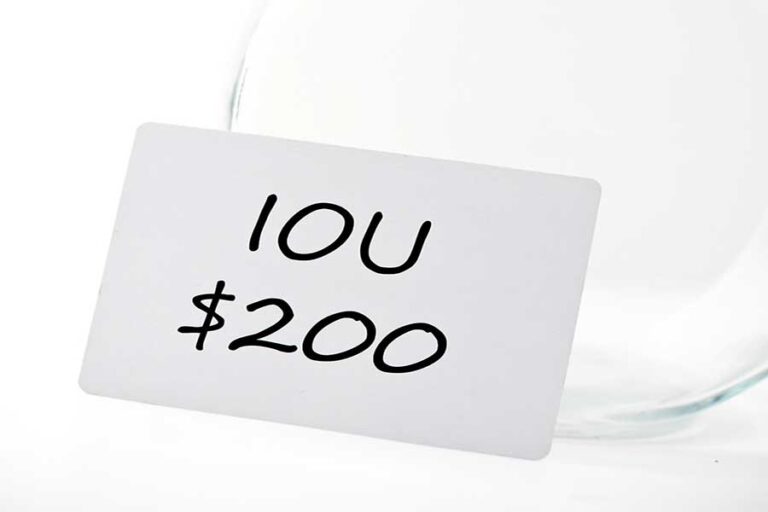Mr. Isaacs passed away a few years after his wife, and was inherited by his son, Yaakov.
Three months later, a neighbor, Mr. Goodman, approached Yaakov. âI wish you condolences for you father, zâl. He was a wonderful man, and a valued neighbor.â
âThank you,â replied Yaakov. âIndeed, he was.â
âI was going through some papers, and found this IOU from him,â said Mr. Goodman. âHe occasionally borrowed money from me.â
âHow much was the IOU for?â asked Yaakov.
âIt was for $200,â replied Mr. Goodman. He showed Yaakov the IOU.
âThat certainly is my fatherâs handwriting,â said Yaakov. âHowever, I know that he was always careful to repay his debts promptly. Maybe he repaid and you forgot to return the IOU to him?â
âI know that sometimes people do not bother to collect their IOUs,â answered Mr. Goodman, âbut I know that this one was not paid.â
âIf youâre sure, I trust you and will pay the $200,â said Yaakov. âMy father would certainly not want a loan that he received to go unpaid. I wonder, though, whether Iâm halachically obligated to pay it.â
âI cannot answer that,â replied Mr. Goodman. âYou can ask Rabbi Dayan. All I can say is that I know that this wasnât paid.â
Yaakov gave Mr. Goodman the $200. The following day, Yaakov was learning in Rabbi Dayanâs beis medrash. He approached him and asked, âWas I obligated to pay the IOU from my deceased father, zâl?â
âShulchan Aruch rules that a borrower is believed that he repaid an IOU, even if the lender still holds it, unless the IOU includes a clause granting credibility to the lender that it was not repaid (neâemanus),â replied Rabbi Dayan. âThis is because a borrower is not always careful to collect the IOU when repayingâ (C.M. 69:2; 108:1).
âRema (ibid.) cites a dissenting opinion, that the borrower is not believed when the lender still holds the IOU, and leaves the decision to the Dayanâs discretion. However, Shach (69:14) rules like the Shulchan Aruch, unless specific circumstances indicate that the borrower would not have left the IOU in the lenderâs hand had he repaid.
Regarding a loan before witnesses without any document â just as the borrower is believed that he repaid, if the borrower died, the heir can claim that perhaps the deceased already repaid. Moreover, the Gemara (B.B. 174a) teaches that beis din will even raise such a claim on behalf of the heir (taâaninan) (C.M. 108:1).
Similarly, Shulchan Aruch rules regarding an IOU that the heir can claim that perhaps it was paid, just as the borrower himself would be believed that he repaid. Even beis din will raise this claim on his behalf (C.M. 69:5).
[However, according to the dissenting opinion that the borrower is not believed when the lender holds the IOU, or according to the Rema and Shach in specific circumstances that the borrower would not be believed, the heir cannot claim that perhaps the IOU was repaid (Nesivos 69:8).]
Nonetheless, if the loan is not yet due, a borrower is not believed that he paid the IOU without proof (unless he could claim that the IOU was forged, in which case he has a migo, a Talmudic principle indicating a case where a person could have proffered a strong lie, so we assume the claim he did make, which is weaker, is not a lie), since we presume that people do not repay before they have to. Similarly, the heir â or beis din on his behalf â cannot claim so without proof, since it is most unlikely that the deceased repaid early (C.M. 69:5; 78:1).
âThus, if the loan was not yet due at the time of death, the heirs are required to pay the IOU, if they recognize the signature or it is verified,â concluded Rabbi Dayan. âHowever, if the loan was already due then, they are not required to pay the IOU, lest the deceased already paid, unless specific circumstances indicate otherwise.â
Verdict: Heirs are not required to pay an IOU that was already due at the time of death, lest the deceased already paid. However, if it was not yet due, we presume that the deceased did not repay it.
To receive BHIâs free newsletter, Business Weekly, send an e-mail to [email protected].
This article is intended for learning purposes and cannot be used for final halachic decision. There are also issues of dina dâmalchusa to consider in actual cases.
To regenerate means to restore or renew something to its original or better condition. It can also refer to the process of growing or developing new tissue to replace damaged or lost tissue in living organisms.
Source link


